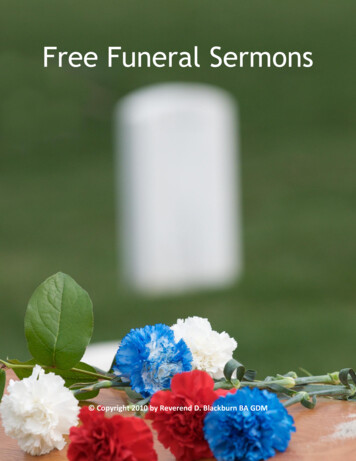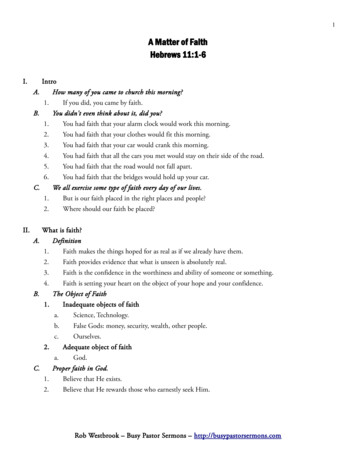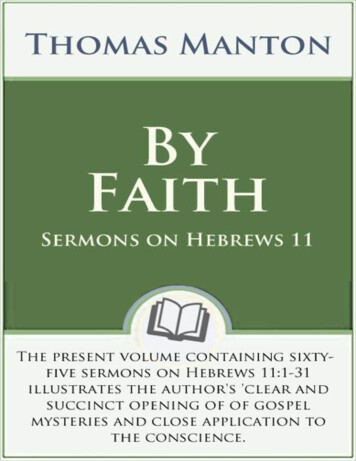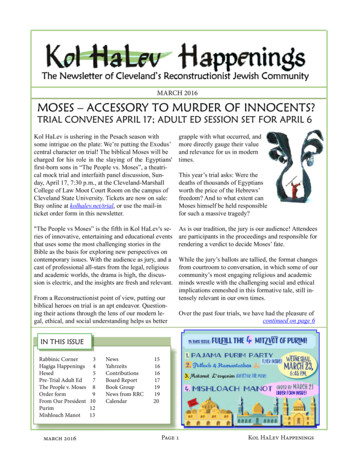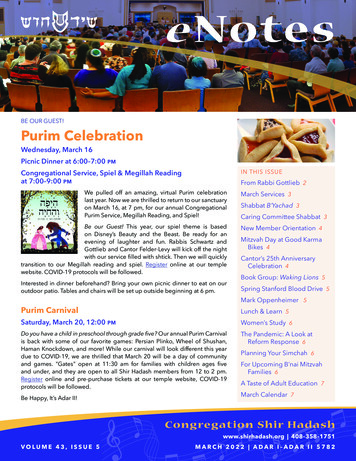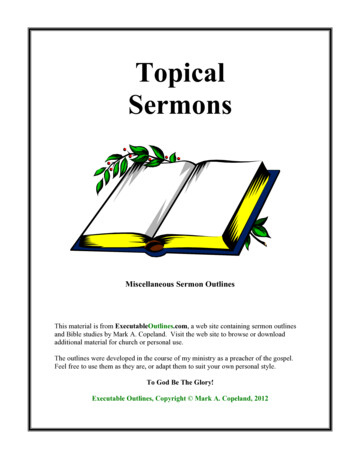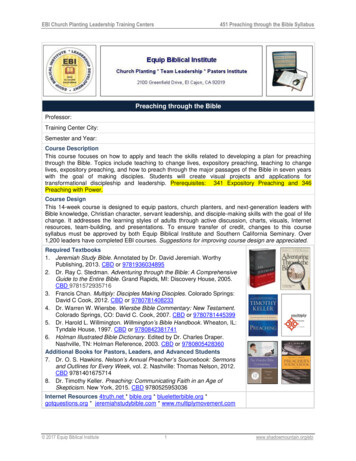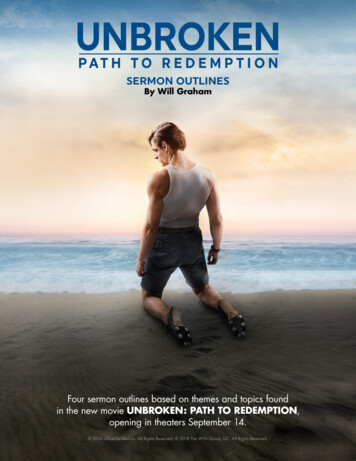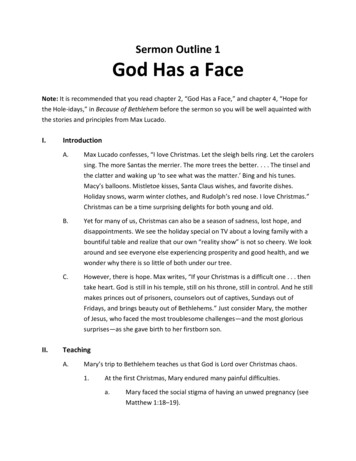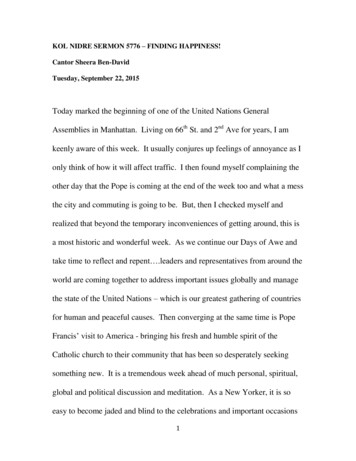
Transcription
KOL NIDRE SERMON 5776 – FINDING HAPPINESS!Cantor Sheera Ben-DavidTuesday, September 22, 2015Today marked the beginning of one of the United Nations GeneralAssemblies in Manhattan. Living on 66th St. and 2nd Ave for years, I amkeenly aware of this week. It usually conjures up feelings of annoyance as Ionly think of how it will affect traffic. I then found myself complaining theother day that the Pope is coming at the end of the week too and what a messthe city and commuting is going to be. But, then I checked myself andrealized that beyond the temporary inconveniences of getting around, this isa most historic and wonderful week. As we continue our Days of Awe andtake time to reflect and repent .leaders and representatives from around theworld are coming together to address important issues globally and managethe state of the United Nations – which is our greatest gathering of countriesfor human and peaceful causes. Then converging at the same time is PopeFrancis’ visit to America - bringing his fresh and humble spirit of theCatholic church to their community that has been so desperately seekingsomething new. It is a tremendous week ahead of much personal, spiritual,global and political discussion and meditation. As a New Yorker, it is soeasy to become jaded and blind to the celebrations and important occasions1
around us. I have found myself standing on the sidelines of a joyous paradeand only feeling frustrated that it was keeping me from crossing the street. Itotally missed the moment.But, there are times that I have been more engaged and delighted with mysurroundings than enraged. I was taught how to experience life like that bymy parents. By their own actions, my mother and father showed my brotherand me how to find joy and beauty in simple moments and how to be blownaway by the stunning ones. The way we go about our lives and interpret ourdaily routine has a direct effect on our inner happiness.I was raised in the most happy home. In a sweet house in New Rochelle, Igrew up with a loving older brother and two tremendously supportiveparents. My mother an opera singer at the Met and my father a Cantor atScarsdale Synagogue, music and spirituality were the foundation of ourfamily and I attribute much of our joy to that. Our music and faith not onlykept us all close, but gave us each a “grateful pair of eyeglasses” in which tosee the world.2
Today, I have an incredible husband and two beautiful boys who all give mehuge amounts of love and laughter each day. I have known adversity andhave had medical challenges in my late teens and twenties that helped giveme more compassion towards the human plight. I have also spent the last 16years serving congregations as a cantor and along with shadowing my fatherthroughout my life in his work as a cantor, I was given profoundopportunities to be there for people at their highest and lowest points. Itcontinues to be an honor and a gift to be in service to the Jewish community.But so I give you an even and honest picture as well, let me say it is also exhausting!!This past January, my father drove me here to the Reform Temple of ForestHills to have a meeting with Rabbi Kaiserman and company about possiblyworking here. I toted my heavy guitar with me and my Dad would neverallow me to schlepp anything on his watch. So, he chauffeured me to thetemple and waited in the car for at least an hour. My 1 year old son was inthe backseat at the time too and it was freezing out. I didn’t worry thoughbecause I knew my son was warm and entertained in the car by fun musicand my father. I also didn’t worry that when I came out, I would be greetedby a grouchy family member that had been waiting longer than expected. I3
knew I would walk out to a cheerful man no matter what. Even if my sonhad been screaming in the car the whole time, I would never know it,because my father would only show the joy and allow you to feel what apleasure it truly was for him to help.So, here I am .I began to work with Rabbi Kaiserman, Rabbi Wood andthe rest of the wonderful team here at RTFH at the end of January 2015. Myfather was serving a congregation in South Salem, New York at the time andworking alongside another great Rabbi, Marcus Burstein, who happened tobe close friends with Rabbi Kaiserman. So, my father and I traded stories onhow awesome it was to work with two wise and warm Senior Rabbis andhow much it made sense that two good people like them would be friends.We were very fortunate.A month later, on February 24th, my father was walking out of acongregant’s home after doing a Shiva Minyan service when he died verysuddenly of a heart attack. He was 74 and we all had no warning. I got thatdreaded phone call from a hospital that changes your life forever and turnseverything upside down. Thank God for shock and our family being soclose – we were able to rally and do all that needed to be done. It was very4
strange to be on the other side of clergy responsibilities though. Being at afuneral home as a grieving daughter and not a cantor was tough. Our horrorwas slowly healed by the love around us. We were raised up by theScarsdale Synagogue Community, the Jewish Family Congregation (wheremy father had been serving) and all our family and friends. But, whattouched me the most was the love and support I got from this community.Rabbi Kaiserman, Rabbi Wood and our temple president, Phyllis Rosenbergalong with her husband and often our right hand man here, MichaelRosenberg, all attended my father’s funeral in Scarsdale. I was deeplytouched. I received the most beautiful and thoughtful cards from the RTFHcommunity and when I came back to work, I was greeted with the best hugs.I was more moved by feeling love from a congregation that hardly knew methan the ones that had known me all my life. I had only been here a monthand hadn’t even begun working full time until this past July and this templeembraced me as one of their own – it is something that will always stay withme and I thank you for being there for me in my darkest hour.A few months after my father died, my dear friend, Kim, passed away afterthe bravest cancer battle I have ever seen for over 4 years. Kim was my ageand left behind a 6 year old son. Our mothers were best friends at Juilliard5
together and Kim and I grew up as the two nutty daughters of our two crazy,amazing and talented moms. It broke my heart when I flew to Californiaand sang at her funeral. She asked me to sing “Here I am Lord” and “AveMaria” at her Catholic ceremony and it was another dark day. Two cheerfuland loving people in this world were gone and I wasn’t sure if I would everknow true bliss again without them. At the wake, someone gave me apicture of my Dad and Kim together from years back. It was striking to methat they were both the happiest and most content people I knew.I fell into a period of deep sadness. Although I don’t suffer from the veryreal illness of Depression, I felt a deep hint at what that must be like andwondered how I would function each day. But, there were my boys, B’naiMitzvah students, Shabbat services and I had to be there. I wanted to bethere and I was grateful I was needed. If I hadn’t been, I would haveoverdosed on the Bravo network on TV with a pint of ice cream. Don’t getme wrong, I still dabbled in that as well as I muddled through my grief. But,life had to go on and work needed to be done.As I worked towards climbing out of the dark dungeon I was in, I began toexplore what seemed to come so easily to my father and Kim .happiness.6
Contentment and feeling happy had been on the forefront of my mind forquite a while as I struggled with feeling so depressed and down on life. Itled me on a therapeutic quest to figure out what it means to others andmyself to truly be happy. I thought if I could harness what created it, then Icould find it again.What I discovered first off is that I am among many - as there are hundredsof books on the subject, documentaries (one from 2011 simply called,Happy, which I definitely recommend). There have even been fascinatingpolls about the happiness level of each country. On March 20th, the UnitedNations hosts what began in 2012 and is known as the International Day ofHappiness. This is an opportunity for countries to have conversations abouttheir people with the support from the U.N on how struggling communitiescan gain more sustenance, compassion and care. A recent Gallop pollshowed that Latin American countries were the happiest with Paraguay,Colombia and Ecuador being the top three. This was based on theaffirmative answers to questions such as “Did you feel well-restedyesterday?” “Were you treated with respect all day yesterday? “Did yousmile or laugh a lot?” “Did you learn or do something interesting?” Anothersurvey released by the U.N. ranked Switzerland, Iceland and Denmark as the7
top three happiest nations based on life expectancy, social connections,personal freedom and the economy. And if you keep digging, you can findan article claiming other countries and demographics are happier based onother factors. So, like with most “polls”, it’s all subjective.I wanted to know more about those who found joy through adversity anddespite it. I watched documentaries and read about people that had gonethrough horrific events and most of them were left with a clear sense ofthemselves, their purpose in life and profound appreciation for each day. Iwatched a documentary called, An Unreal Dream about Michael Morton,who was convicted of killing his wife in 1986. He always proclaimed hisinnocence and kept his head high in prison for 25 years. He inspired otherprisoners with his great attitude and peaceful demeanor. His only sonbecame estranged from him and even in the depths of his despair, he felt thepresence of God in prison and always remained hopeful. He was exoneratedthrough DNA evidence and The Innocence Project in 2011. The prosecutorwithheld evidence that would have initially found him not guilty back in1987 and was convicted of this crime after Morton’s sentence wasoverturned. Michael Morton had every reason to feel frustration, anger anddepression over having lost so much. But, he wasn’t and isn’t . He found8
love, reunited with his son and found great redemption in now being agrandfather to a little girl named after his slain wife – which has made up forlost time in many ways. In his interviews, he exudes so much joy. Here arehis parting words in the film about his life, “Now, everything is different forme .the conundrums of life, the philosophical paradoxes, themetaphysical problems, I feel like I get it now. I understand suffering andunfairness I can’t think of anything better to receive than that. I’m goodwith this, this world, what’s happened to me, where I am going and what Iam doing and I know three little simple things now because of that .1)God exists 2) God is wise and smarter than I am and 3) God loves me. Youknow those three things, then what’s your problem?”Those words helped lift me out of the fog. All of sudden, it was so clear tome. I had my father for 74 years and his warmth, teachings and cheerfulspirit are always with me. I loved Kim her whole life and am stronger andbetter for having known her. I’m alive, I have a family, friends, faith,community and I love my work so what is my problem? Nothing. I havefaced my worst fear of losing a parent and I survived it. I have watched adear friend get cheated out of her life and instead of hating the world for it, Iwant to live deeper and hold my sons tighter in her honor. God gave us a9
promised land and God commanded us to live a certain way .but Goddoesn’t guarantee or promise us happiness anywhere in the Torah – notdirectly. Our joy comes from G’milut Chasadim, acts of loving kindness,living a righteous life, having the Torah to guide our steps along life’s trickypath. It is an unspoken promise if we follow our faith and our hearts. We arecommanded to praise God with a joyful heart and it is implied that we willthen receive that in return. But, happiness comes out of the challenges andfailures within our Biblical text as well. We grow and learn from thosejourneys we find clarity and relief from suffering. I appreciate this quotefrom Winston Churchill “If you are going through hell, keep going!”I thought I couldn’t bare the upcoming High Holy Days. I thought thememories of my father in his long white robe with his extraordinary voicewould break me down. But, instead they have given me a jubilant heart,sweet pictures in my mind, soothing sounds of Sacred Music in my soul andthe drive to be happy against all odds.Now, when I am sitting in terrible traffic or on a delayed train, instead ofwanting to scream, I channel my father and Kim and all the ecstatic faces ofthose that have walked out of all kinds of wrongful imprisonment and the10
joyful smiles of the disabled and sick and only allow a sense of calm toovercome me.I realize now that whether my father knew it or not, he was driving me to asafe haven that would help me heal during my toughest time – when hedrove me to this temple just four weeks before he died. Somehow, God andmy Dad placed me where I needed to be during this time. Perhaps, if wetake the time to think about it, all of us are driven somewhere andsurrounded by comfort we didn’t even know we would need when thoseshocking and painful moments come and that’s God at work.In the coming year, may our grief, sadness, regrets and frustrations meltaway and re-form as something that brings us contentment, peace and yes,even happiness. Then, loss, funerals, Yizkor services, all aspects of ourfaith, community, giving and forgiving all become the same – beautifullessons and reminders of the love and joys that life has to offer. May we allbe inscribed for a healthy, happy and exciting year ahead. Amen!11
So, here I am .I began to work with Rabbi Kaiserman, Rabbi Wood and the rest of the wonderful team here at RTFH at the end of January 2015. My father was serving a congregation in South Salem, New York at the time and working alongside another great Rabbi, Marcus Burstein, who happened to be close friends with Rabbi Kaiserman.
